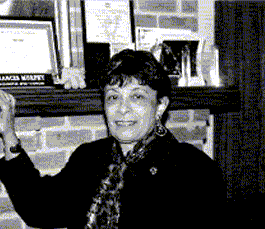Page 136
[Begin Tape 1, Side A]
Ingersoll: Frances, last summer when you were working on that hundredth anniversary edition of the Afro, you must have taken quite a number of backward glances at the Afro and the five generations of Murphys who have put it out. Tell me, who was John Murphy, Sr.?
Murphy: He was the founder of the Afro-American newspaper, Fern, and, of course, my grandfather. He was a slave who had gone into the Civil War and came out a freed man. He did many jobs. Then when the administration changed from Republican to Democrats, he lost his job. He was a printer at that time, so he was in this printing company, and they were going out of business. They were putting the equipment for the printing plant up for auction. My grandmother, Martha Howard Murphy, had come from a family that was fairly wealthy up there in Montgomery County, and she had saved $200, despite the fact that she had ten children. So we say that she loaned her husband the money, but, of course, today we would have said it was equal sharing. He went to the auction and put the $200 down on the equipment for the Afro-American newspapers, as we know it today.
Ingersoll: Do I understand correctly that he had put out a small Sunday school newspaper before that?
Murphy: Yes. He was superintendent of the Sunday school at Bethel A.M.E. Church in Baltimore. That was the largest A.M.E. church in Baltimore, and they had what was called the Sunday School Helper. So he was really printing that already. He wanted to pull together the Sunday schools all over that area, the Baltimore metropolitan area, and the only way he could do that, of course, was to put out his own little newspaper, and that's what he did—the Sunday School Helper.
Ingersoll: Ten children, and one of them was your father Carl Murphy.
Murphy: That's right.
Ingersoll: At what point did he enter the scene of the Afro-American?
Murphy: My father was professor of German here at Howard University. My grandfather was getting a little old, of course, and he asked him to come home. My father talked it over with my mother, who, incidentally, was also a Washingtonian, and she said, "Yes, we'll go back to Baltimore." So they went to Baltimore in 1918, I think it was, and from there he started working with his father. When my grandfather died in 1922, my father took over the newspapers.

